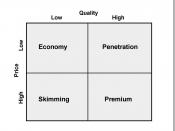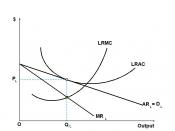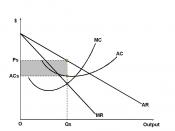The objective of this essay is to "use economic theory and illustrative examples to outline the circumstances under which a price war could come about and the likely consequences for the participating firms and their consumers". A price war is a period in which multiple firms competing within the same market will react to the other firms lowering of price by lowering their own price. They have short-term and long-term advantages and disadvantages.
There are many reasons for which a price war may occur, in all cases the reason for starting the price war is different but the reason for its continuation is not to lose sales. They are when a firm attempts to maximise capacity, for survival purposes, in oligopoly markets, where there are homogeneous products and when a firm adopts a penetrative pricing strategy.
"Excess capacity refers to a situation where a firm is producing at a lower scale of output than it has been designed for" Excess capacity http://stats.oecd.org/glossary/
detail.asp?ID=3209 [accessed 10th December 2006] If a firm has spare capacity to produce more of a good it is likely they will use this spare capacity to profit maximise but to achieve this they will have to lower prices to increase quantity demanded (see appendix item A). As they have decreased their prices, other competitors will likely drop their prices so as not to loose customers, creating a price war.
Companies who face bankruptcy may try to lower their prices so to attract more consumers and increase sales volume. However, if they cannot manage to increase volume enough to cover the fall in contribution then it will fail to cover its variable costs and will be forced to leave the market. Other firms may recognise that the company is in trouble and in a bid to force the...


